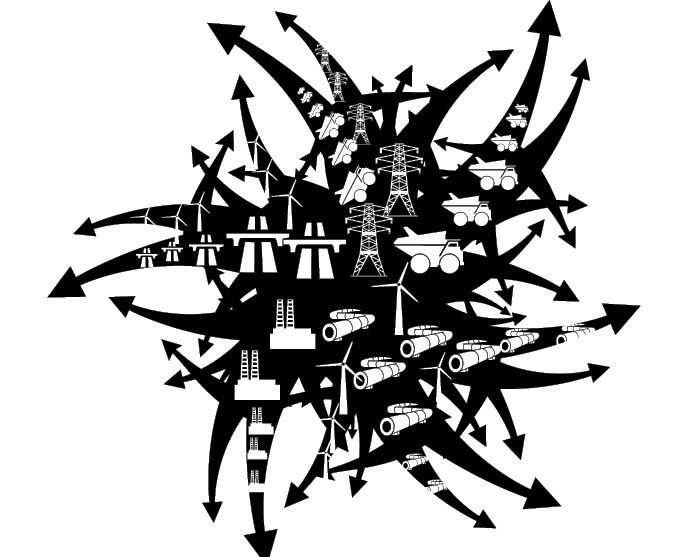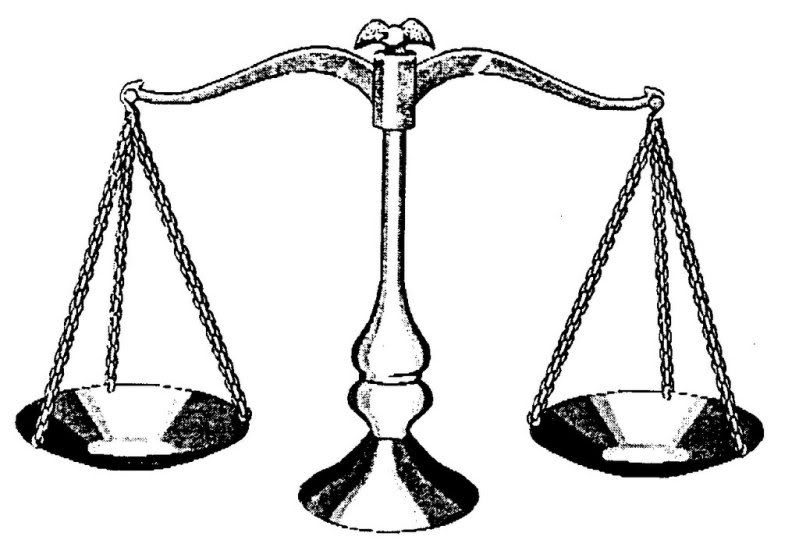Human Corruption in Government
One of the major points that is subconsciously accepted by all people who live under a government is that the people in the government are not perfect. The thing that varies is the extent of their human corruption. While they have an oath of honor and dedication to the people, they also have other human desires that may override their oaths and promises. I'm going to discuss some of the manners in which the political figures in the U.S.A. are mainly corrupted, how it happens, and why it is allowed.
The free market allows for huge profits to be gained and maintained through less than wholesome means. This shadiness can occur in many forms, from outsourcing labor to other countries to minimize expense and maximize profit, rigorous and possibly deceitful advertising campaigns, and buying out local politicians in order to protect their profit margin. The outsourcing and cheap labor is hidden by the extravagant advertising campaigns which try to get the public's mind off of HOW it is made and more focused on how it looks and how your social status may increase if you purchase it. This sort of focus on materialism drives capitalist society and helps it thrive. The advertising campaigns also serve to appeal to the demographic that most purchases the product and to garner new demographics. Therefore they try to appeal more and more to their core demographic while trying not to alienate their other demographics. But all this is meaningless if their profits are hampered by taxes which lowers their already large profit margins. This is where human corruption comes into play.
This shadiness can occur in many forms, from outsourcing labor to other countries to minimize expense and maximize profit, rigorous and possibly deceitful advertising campaigns, and buying out local politicians in order to protect their profit margin. The outsourcing and cheap labor is hidden by the extravagant advertising campaigns which try to get the public's mind off of HOW it is made and more focused on how it looks and how your social status may increase if you purchase it. This sort of focus on materialism drives capitalist society and helps it thrive. The advertising campaigns also serve to appeal to the demographic that most purchases the product and to garner new demographics. Therefore they try to appeal more and more to their core demographic while trying not to alienate their other demographics. But all this is meaningless if their profits are hampered by taxes which lowers their already large profit margins. This is where human corruption comes into play.
Congressman and women can easily be bought by companies to vote for bills that would tax or prevent profiteering from less than moral means. While one would expect that some of these officials would have a backup argument in order to cover for their accepting of company money to protect company interests as opposed to their job of protecting the interests of the American people, many times these politicians use hollow vague arguments or just stay silent. Why isn't this sort of thing noticed? The fact is that much of society doesn't focus onto politics. The media focuses the youth more onto indulgence (as stated in previous articles). In a recent example, a woman was raped in her occupation working for a defense contractor, the men who gang-raped her were put in arbitration by the company, but she when returned to the US had no legal right to sue for the rape that she endured. When attempting to sue, the contractors noted that there had been an "anti-rape" clause in her contract. This spurred a piece of legislation to make companies unable to put this sort of clause in their contracts as it prevents justice from being exacted. While one would again assume this would be a unanimous yes, many of these kindhearted politicians have decided that the government should not be involved in private company contracts and disagreed to the clause, referring to the rape as an "incident" in an attempt to downplay it.
would tax or prevent profiteering from less than moral means. While one would expect that some of these officials would have a backup argument in order to cover for their accepting of company money to protect company interests as opposed to their job of protecting the interests of the American people, many times these politicians use hollow vague arguments or just stay silent. Why isn't this sort of thing noticed? The fact is that much of society doesn't focus onto politics. The media focuses the youth more onto indulgence (as stated in previous articles). In a recent example, a woman was raped in her occupation working for a defense contractor, the men who gang-raped her were put in arbitration by the company, but she when returned to the US had no legal right to sue for the rape that she endured. When attempting to sue, the contractors noted that there had been an "anti-rape" clause in her contract. This spurred a piece of legislation to make companies unable to put this sort of clause in their contracts as it prevents justice from being exacted. While one would again assume this would be a unanimous yes, many of these kindhearted politicians have decided that the government should not be involved in private company contracts and disagreed to the clause, referring to the rape as an "incident" in an attempt to downplay it.
Why does this happen? Human greed. Not even the pope could escape the vices that plague mankind. But what_corrupt_collusion_wa.jpg) can we do to combat human err in our government? Focus on the vices and try to eliminate them. When we notice that politicians are receiving exorbitant amounts of money from corporations, it should be fully printed in the paper of that district, and publicized so that they allegiances of these elected officials are well known. Then it is the responsibility of the informed public to vote out the corrupt and try to elect those who would be unwavered by such offers and have a genuine desire to represent their district. So who to blame who to blame? Corporations for protecting their profit margin and taking advantage of weak minded congressman and the American public. The weak-minded politicians who fall to their vices as opposed to their duty. Maybe the American Public for allowing these people to be elected.
can we do to combat human err in our government? Focus on the vices and try to eliminate them. When we notice that politicians are receiving exorbitant amounts of money from corporations, it should be fully printed in the paper of that district, and publicized so that they allegiances of these elected officials are well known. Then it is the responsibility of the informed public to vote out the corrupt and try to elect those who would be unwavered by such offers and have a genuine desire to represent their district. So who to blame who to blame? Corporations for protecting their profit margin and taking advantage of weak minded congressman and the American public. The weak-minded politicians who fall to their vices as opposed to their duty. Maybe the American Public for allowing these people to be elected.
Its a whodunit on the death of Honor in Politics. When it died? Probably when it began, but what should we be doing as a people? Allow it to continue its death throes, or try to revive it in clean manner and perfect our government so it could be the envy of the world. As of now, each corporation can pick and choose their politician by the price-tag dangling from their neck. I'll do my part to wheedle out the corruption by voting for people who I believe to be devoted, but the question is, will others follow suit?
Exeunt.
The free market allows for huge profits to be gained and maintained through less than wholesome means.
 This shadiness can occur in many forms, from outsourcing labor to other countries to minimize expense and maximize profit, rigorous and possibly deceitful advertising campaigns, and buying out local politicians in order to protect their profit margin. The outsourcing and cheap labor is hidden by the extravagant advertising campaigns which try to get the public's mind off of HOW it is made and more focused on how it looks and how your social status may increase if you purchase it. This sort of focus on materialism drives capitalist society and helps it thrive. The advertising campaigns also serve to appeal to the demographic that most purchases the product and to garner new demographics. Therefore they try to appeal more and more to their core demographic while trying not to alienate their other demographics. But all this is meaningless if their profits are hampered by taxes which lowers their already large profit margins. This is where human corruption comes into play.
This shadiness can occur in many forms, from outsourcing labor to other countries to minimize expense and maximize profit, rigorous and possibly deceitful advertising campaigns, and buying out local politicians in order to protect their profit margin. The outsourcing and cheap labor is hidden by the extravagant advertising campaigns which try to get the public's mind off of HOW it is made and more focused on how it looks and how your social status may increase if you purchase it. This sort of focus on materialism drives capitalist society and helps it thrive. The advertising campaigns also serve to appeal to the demographic that most purchases the product and to garner new demographics. Therefore they try to appeal more and more to their core demographic while trying not to alienate their other demographics. But all this is meaningless if their profits are hampered by taxes which lowers their already large profit margins. This is where human corruption comes into play.Congressman and women can easily be bought by companies to vote for bills that
 would tax or prevent profiteering from less than moral means. While one would expect that some of these officials would have a backup argument in order to cover for their accepting of company money to protect company interests as opposed to their job of protecting the interests of the American people, many times these politicians use hollow vague arguments or just stay silent. Why isn't this sort of thing noticed? The fact is that much of society doesn't focus onto politics. The media focuses the youth more onto indulgence (as stated in previous articles). In a recent example, a woman was raped in her occupation working for a defense contractor, the men who gang-raped her were put in arbitration by the company, but she when returned to the US had no legal right to sue for the rape that she endured. When attempting to sue, the contractors noted that there had been an "anti-rape" clause in her contract. This spurred a piece of legislation to make companies unable to put this sort of clause in their contracts as it prevents justice from being exacted. While one would again assume this would be a unanimous yes, many of these kindhearted politicians have decided that the government should not be involved in private company contracts and disagreed to the clause, referring to the rape as an "incident" in an attempt to downplay it.
would tax or prevent profiteering from less than moral means. While one would expect that some of these officials would have a backup argument in order to cover for their accepting of company money to protect company interests as opposed to their job of protecting the interests of the American people, many times these politicians use hollow vague arguments or just stay silent. Why isn't this sort of thing noticed? The fact is that much of society doesn't focus onto politics. The media focuses the youth more onto indulgence (as stated in previous articles). In a recent example, a woman was raped in her occupation working for a defense contractor, the men who gang-raped her were put in arbitration by the company, but she when returned to the US had no legal right to sue for the rape that she endured. When attempting to sue, the contractors noted that there had been an "anti-rape" clause in her contract. This spurred a piece of legislation to make companies unable to put this sort of clause in their contracts as it prevents justice from being exacted. While one would again assume this would be a unanimous yes, many of these kindhearted politicians have decided that the government should not be involved in private company contracts and disagreed to the clause, referring to the rape as an "incident" in an attempt to downplay it.Why does this happen? Human greed. Not even the pope could escape the vices that plague mankind. But what
_corrupt_collusion_wa.jpg) can we do to combat human err in our government? Focus on the vices and try to eliminate them. When we notice that politicians are receiving exorbitant amounts of money from corporations, it should be fully printed in the paper of that district, and publicized so that they allegiances of these elected officials are well known. Then it is the responsibility of the informed public to vote out the corrupt and try to elect those who would be unwavered by such offers and have a genuine desire to represent their district. So who to blame who to blame? Corporations for protecting their profit margin and taking advantage of weak minded congressman and the American public. The weak-minded politicians who fall to their vices as opposed to their duty. Maybe the American Public for allowing these people to be elected.
can we do to combat human err in our government? Focus on the vices and try to eliminate them. When we notice that politicians are receiving exorbitant amounts of money from corporations, it should be fully printed in the paper of that district, and publicized so that they allegiances of these elected officials are well known. Then it is the responsibility of the informed public to vote out the corrupt and try to elect those who would be unwavered by such offers and have a genuine desire to represent their district. So who to blame who to blame? Corporations for protecting their profit margin and taking advantage of weak minded congressman and the American public. The weak-minded politicians who fall to their vices as opposed to their duty. Maybe the American Public for allowing these people to be elected.Its a whodunit on the death of Honor in Politics. When it died? Probably when it began, but what should we be doing as a people? Allow it to continue its death throes, or try to revive it in clean manner and perfect our government so it could be the envy of the world. As of now, each corporation can pick and choose their politician by the price-tag dangling from their neck. I'll do my part to wheedle out the corruption by voting for people who I believe to be devoted, but the question is, will others follow suit?
Exeunt.






















